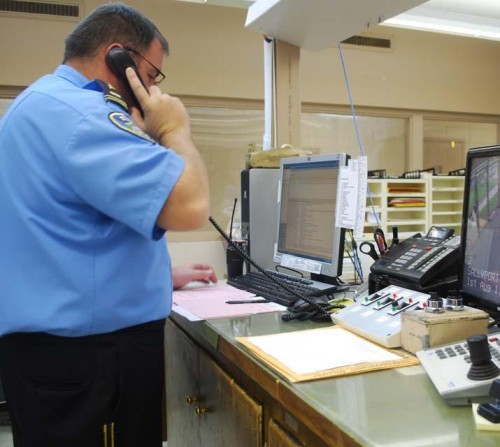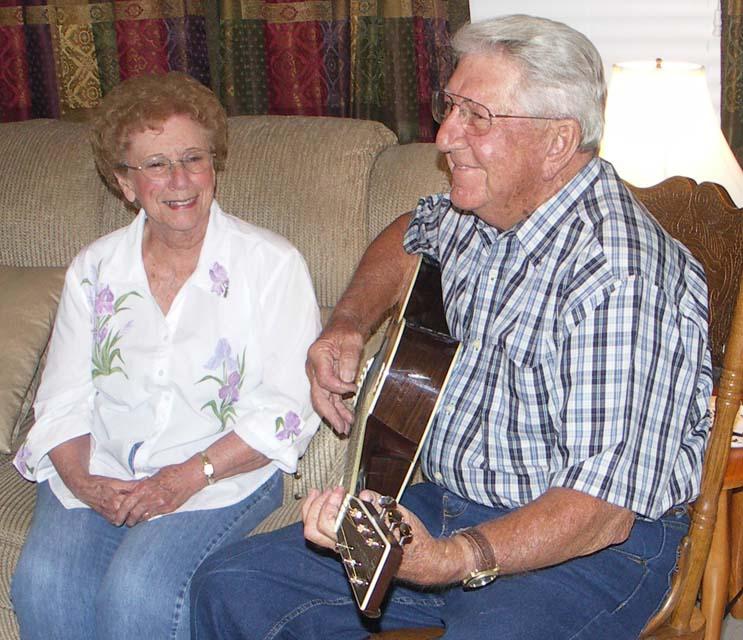Friday, Aug. 5
August 5, 2011
Laf. detention center could be refurbished
August 9, 2011It was 51 years ago today that the Louisiana Hayride show discontinued its live weekly radio program. During its 12-years on the air, the “Cradle of the Stars,” as it was known in the country music business, became a birthplace of many legends of the 1950s and 1960s. They were performers who only hoped to make their lives better than what they had experienced up until that time.
Broadcast from the Shreveport Municipal Auditorium, the careers of individuals such Johnny Cash, Kitty Wells and Elvis Presley were launched.
Among many southern performers that passed through the Louisiana Hayride, a healthy number went on to star on the larger Grand Ole Opry, the world’s longest running radio program, out of Nashville, Tenn.
Along with the likes of Ernest Tubbs, Webb Pierce and Hank Williams was a teenage singer who brought to the party a unique Cajun influence that impacted not only his style but that of other performers as well. That young man was Lafourche Parish native Ervin J. “Vin” Bruce.
Bayou Background
On Saturday, Vin Bruce, 79, reflected on his life, career, awards, country and Cajun music, and talked about what he is doing today.
From their comfortably modest home in Cut Off, Bruce and his wife of 60 years, Miss Aline, welcomed afternoon guests with coffee, cinnamon rolls, conversation filled with their native dialect, a characteristic that is absent when Bruce sings, and a song to cap off the visit.
Bruce was born the youngest of 10 children to a family that lived off the land and bayous of southern Louisiana. His father was a muskrat trapper and alligator hunter. On occasions when relaxation was in store, Levy Bruce played the fiddle and encouraged his youngest boy to appreciate music.
“My dad was a fiddle player,” Bruce said. “My two brothers was guitar players, but I could do better dan dem. We had an old battery radio wit da wire to da roof and dat was your antenna. We listened to de Grand Ole Opry on Saturday nights. So he say, ‘One day maybe… .'” Bruce paused and his eyes swelled with tears as he recalled his father’s words. “I could cry,” Bruce said. “He say, ‘Maybe one day you can be dere if you keep on singin’.”
Bruce’s lack of interest in formal education prompted him to drop out of school in the eighth grade. He went to trapping and playing music in local bars and dance halls to help support the family. At the age of 14, he had earned enough money to purchase a 1938 Ford. “I’m only sayin’ dis because sometime I like to discuss my past. We were so poor and it is time somebody knows what we been tru. What we were able to do,” he said.
“My family been here from way back, but nobody kept records,” Bruce said. “Bruce. Dat don’t sound French, but it is.” He speculated that the family moniker might be the result of a shortened name of which the sound Bruce was a part.
Emerging Career
Johnny Schouest was related to Bruce by marriage and owned an area drive-in. Schouest was a man that recognized talent and had the personality to make the right dream a reality. He became a catalyst in expanding the young musician’s career.
“Johnny, he says one day, ‘dey got Ernest Tubb comin’ to da municipal auditorium. I’m gonna’ bring you. I know you want to meet him.'”
Schouest took Bruce to see Ernest Tubb and bought a front row seat for the Cajun musician. “He says, ‘sit down.’ He went back dere and met Ernest Tubb and says, ‘Dere’s a little boy here dat,’ he probably lied to him and say I was crippled or somedin’, you know, he say, ‘he wants to meet you.'”
Bruce received an immediate backstage invitation to meet Ernest Tubb, who at the time, Bruce pointed out, was a bigger star than Hank Williams.
“My first word of talkin’ to Ernest Tubb was, I said, ‘I sing like you,'” Bruce said. “He stood down and he say, ‘Son, look at me. Deys only one Ernest Tubb.’ He say, ‘You sing like you.’ I’ll never forget dat. Ernest Tubb was my hero.”
As was tradition in the old days of country music, Ernest Tubb invited young Vin Bruce to perform with him. The teenager became an instant hit among listeners as well as established musicians. Years later, Bruce’s first appearance on the Grand Ole Opry was also with Ernest Tubb.
“Let me tell you a little secret,” Bruce said of his initial paid performance on the Louisiana Hayride. “Da first time I went on, Webb Pierce was the hottest artist dey had. We got in and da curtain was about dis high [Bruce holds his hands about 2 feet apart] above da stage. So, here I am. At dat time, dey called Vin Bruce on da stage. Everybody was hollerin’ and clappin’, you know. I didn’t know. I tot dey was clappin’ for me. But Webb Pierce had just walked backstage. Webb Pierce had flashy clothes and boots wit diamonds on. Da people, dey saw his boots and was clappin for him. I tot it was me. I wished I had owned his boots to walk around.”
Big Break
Bruce had plenty of applause and cheering fans of his own over the years. He performed with Dudley Bernard and the Southern Serenader’s Band and later Eugene Rodrigue and the Louisiana Troubadours Band between 1946 and 1950. Playing on a radio show out of New Orleans, Bruce learned from Schouest that an agent named Henry Hildebrand wanted to find him.
“We didn’t have no phone,” Bruce said. “So he called Johnny and says, “Who’s da boy singin’ on da radio?’ So Johnny told him who I was. From den, Henry Hildebrand contacted [Columbia Records representative] Don Law. Henry told him how good I was so he took a chance.”
At the age of 17, equipped with a $250 top-of-the-line Martin guitar he financed, Bruce signed a contract with Columbia Records on Oct. 22, 1951 and was ready to appear on the Grand Ole Opry. “My streak of luck was goin’ just right,” he said.
It was on that same October day in Nashville, Tenn., that Bruce met 28-year-old Hank Williams and formed a relationship that would result in the boy from Lafourche Parish performing at both Williams’ public wedding ceremony to Billie Jean Jones Eshlimar in New Orleans on Oct. 18, 1952, and less than three months later at Williams’ funeral on Jan. 4, 1953 in Montgomery, Ala. “Anyway, it kept on,” Bruce said.
During the early years of his career, Bruce recorded popular Cajun songs including “Dans La Louisiane,” “Fille de la Ville” and “Clair de la Lune.” He performed in both French and English and was a standout among country music artists of his generation with songs such as “Knockin’ on the Door,” “Sweet Love” and “I Tried.”
Changes and Accolades
Columbia did not renew Bruce’s contract in 1956 because the popularity of a new music genre called rock ‘n’ roll promised to be more profitable.
Before he could fall, Bruce was picked up by Swallow Records and continued recording with his band, The Acadians. His popularity remained strong with fans across the United States, Canada and in Europe. He made guest appearances with other performers and played at various shows and events on a regular basis into the 1980s.
Bruce was inducted into the Country Music Hall of Fame in 1986, the Belizaire Cajun Music Hall of Fame in 1988, the Official Cajun Music Hall of Fame in 1996 and was designated as a Louisiana Hall of Fame Living Legend in 1998.
Among his recordings are those on which he partnered with Chet Atkins, Grady Martin, Tommy Jackson, Harold and Owen Bradley, and Shook Jackson.
Among the recognitions in which he takes the most pride is a permanent exhibit honoring him and his career that is displayed at the South Lafourche Parish Library. “Dey built me an exhibit, jus for me, wit my awards. Dey asked me if I would put some of my stuff here,” Bruce said as he and Miss Aline showed their guests the corner with his name above an entrance and recalled memories. “Maybe some of dees kids will learn from dis,” he said.
Insights and Reflections
Bruce and Miss Aline met while he was working a dance hall in Galliano. “We just saw each other, caught each others eyes I guess, and got our attention,” Miss Aline said. “We went out for 15 months together den we got married. And we’re together ever since.”
The Bruces raised five children in Lafourche Parish and have five grandchildren, including a 3-year-old that likes to sing his PawPaw’s songs. “You should see dat boy,” Bruce said. “He sings all da French songs.”
Bruce fears that the traditional southern country sound could become lost as the era of so-called new country morphs into more of a rock ‘n’ roll and pop music style. “Today, deys have writers dat write da song for da artist and are pitchin’ songs for you,” Bruce said. “It’s not deir own. It’s not da same.”
During the years, Bruce and his wife toured together when they could, and Miss Aline revealed, with a laugh, that they maintained a strong relationship by riding in separate motor homes. “Believe me, my wife is always da type that kept me goin’,” Bruce said. “I never did like to travel. My wife, she loves to travel. Oh my, and we got friends by travelin’.”
Music has remained at the soul of Bruce’s life while he stays busy with additional interests. Among his activities, Bruce is a member of the Greater Lafourche Port Commission. It was prior to a commission meeting that he was approached by some of his local fans that suggested he again record traditional music of the region including swamp pop. “So I’m puttin’ on da voice,” he said.
Bruce is currently completing a Cajun country and swamp pop CD with Cin-Key Studios that is expected to be released in September.
Influence Recognized
Although it has aged with time, Bruce’s voice and giving manner continues to impact others.
“Vin Bruce was a great influence in my music,” musician and Houma resident Waylon Thibodeaux said. “He inspired me to perform and bring our Cajun heritage to the people.”
As had been done for him decades earlier, it was during a performance of his own that Bruce invited then 14-year-old Thibodeaux to perform on his fiddle during a telethon at Alex Broussard’s Ranch in Lafayette.
“He saw that I was totally mesmerized by the music,” Thibodeaux said. “He also told me to never give it up, that music would bring me places. He was absolutely correct. Vin and I have formed a musical friendship for life. What a voice.”
“He never quit yet. He plays a lot of benefits,” Miss Aline said. “Da only difference is he doesn’t go to dance halls no more.”
Final Cut
“Without da little voice I got, I would never been anywhere in my life,” Bruce said. “I traveled da world. Sometimes you haf’ta realize you can’t live forever on dis earth. So, I tank God for givin’ me all da opportunity to help make people happy. I was born poor. I ain’t no millionaire, but I’m rich. Tank God he took me in and said, ‘Maybe you gonna’ be doin’ a little bit better.'”
Relaxing at home in Cut Off, Vin and Aline Bruce spend time together has he serenades her with “You Belong to My Heart” MIKE NIXON












